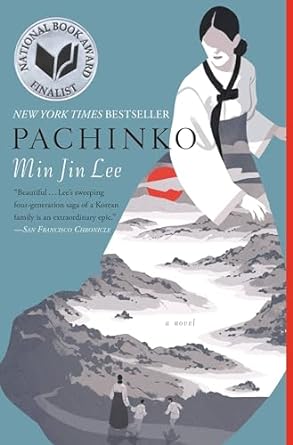
Synopsis Credit: Barnes & Noble
In the early 1900s, teenaged Sunja, the adored daughter of a crippled fisherman, falls for a wealthy stranger at the seashore near her home in Korea. He promises her the world, but when she discovers she is pregnant—and that her lover is married—she refuses to be bought. Instead, she accepts an offer of marriage from a gentle, sickly minister passing through on his way to Japan. But her decision to abandon her home, and to reject her son’s powerful father, sets off a dramatic saga that will echo down through the generations.
Richly told and profoundly moving, Pachinko is a story of love, sacrifice, ambition, and loyalty. From bustling street markets to the halls of Japan’s finest universities to the pachinko parlors of the criminal underworld, Lee’s complex and passionate characters—strong, stubborn women, devoted sisters and sons, fathers shaken by moral crisis—survive and thrive against the indifferent arc of history.
My review
Set against the backdrop of Japan’s annexation of Korea in 1910, Pachinko delves into themes of identity, resilience, and the pursuit of a better life amidst profound adversity.
At the heart of Pachinko is Sunja, a young woman whose life is irrevocably altered when she becomes pregnant by Hansu, a wealthy and married Korean man living in Japan. Faced with the scandal of her pregnancy and Hansu’s refusal to marry her, Sunja’s path takes a pivotal turn. Hansu offers financial support but no future, leading Sunja to marry Isak, a minister who provides her with a chance at a new life. Together with Isak, Sunja relocates to Japan, where they face the daunting task of building a life in a foreign land.
As Sunja and Isak navigate their new reality, their family grows with the birth of two sons, Noa and Mozasu. However, their hopes for a peaceful existence are constantly undermined by the pervasive racism and discrimination faced by Koreans in Japan. Through the lens of this family’s struggles, Pachinko paints a vivid portrait of the economic hardships, cultural dislocation, and societal challenges that marked the Korean diaspora’s experience in Japan throughout the 20th century.
Pachinko references the Japanese gambling game that symbolizes the unpredictable nature of the family’s fortunes and struggles. Just as in the game, where the outcome is often left to chance, Sunja and her descendants confront an array of uncontrollable forces that shape their destinies. Pachinko is a compelling and thought-provoking read that captures the complexities of identity, the impact of historical events on personal lives, and the enduring strength of familial bonds.
I would recommend this book to anyone, and it definitely a book that I would read again